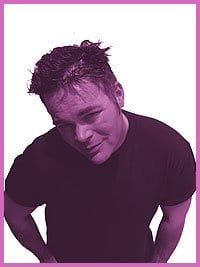It’s great to be gay and good to be Greek, but being openly gay in a Greek fraternity? While some chapters claim to be accepting, don’t wait for the welcome wagon to roll in just yet.
“Colleges tend to reflect the society around them, and Canada is way ahead of the USA on gay and lesbian and bisexual issues,” says Shane Windmeyer, openly gay former member of Phi Delta Theta and coeditor of the book Out On Fraternity Row: Personal Accounts Of Being Gay In A College Fraternity. “But during a rush, if a brother is gay he will probably be rejected.”
Rush week, the period in which students vie for spots in frats and sororities and individual chapters vie for choice students, is just around the corner. But out queers looking to get in on the fraternal love may have a hard time making the cut.
“It makes no difference to us what sexual orientation you are or what race you are for that matter,” says a member of U of T’s Lambda Chi Alpha at the University Of Toronto. “It just matters that you’re a gentleman and that you’re interested in the fraternity and you have the same ideals.” Although he declined to give his name he claims to speak on behalf of the local chapter.
So are frats welcoming to gay men? “Obviously not. We’re welcoming, but I don’t know. Wouldn’t they be better joining a gay group?”
In recent years Greek societies have been trying to shed the stereotype that frat boys are beer-guzzling jocks and sorority sisters are skinny blondes, to prove that they accept all sorts of people. While it’s clear they’re trying to change their ways from being all about booze, babes and brotherhood to being well-rounded philanthropic heroes, becoming accepting of queers in their midst is low on the to-do list.
Sigma Chi’s Beta Omega chapter seems to be the exception in Toronto. According to former chapter president Tim Reeve-Newson, not only do they welcome queer students, while he was there there were two openly gay members. One was also part of the executive committee for a year.
“Overall I think they were both comfortable admitting their sexuality and felt welcome,” says Reeve-Newson. “Although I could imagine queer students would not feel very welcome at any fraternity because of the popular mentality of fraternities being an old boys club, ie straight. That old boys club is a stereotype that is hard to disprove.”
Of the fraternities and sororities in Toronto, at least two claim to have current or former members who were out. Alpha Phi says that in the past they have had lesbian members and Lambda Chi Alpha says they have one gay member currently and two in previous years.
But the subject seems to be contentious. Kappa Kappa Gamma said they couldn’t talk about the issue with the press. Lambda Chi Alpha chapter president Brad Gualtieri says that the Lambda Chi Alpha member who spoke anonymously to Xtra shouldn’t have revealed that they had gay brothers.
“Whoever said we had a gay member shouldn’t have done that because it’s private. It’s in the house,” says Gualtieri.
While some chapters may be coming around, there is still the issue of homophobia within the international or national headquarters of each organization. Out of the 133 frats listed with the North American Interfraternal Foundation, there are only a dozen fraternities that include sexual orientation in their nondiscrimination policies.
On the other hand, some national and international headquarters actively discourage chapters from including openly gay members and shame chapters that don’t comply.
“They’re worried about being known as the gay fraternity. I don’t think it’s as much a fear as it was 10 years ago but I know that it’s very much alive,” says Windmeyer, who helped found Lambda10.org, a website to discuss and provide resources on queer fraternity and sorority issues across North America.
Windmeyer believes it’s more acceptable to be queer in a sorority because “for sorority women the issue of sexual orientation is more fluid.” But he notes it’s not something that is openly discussed.
Discussed or not, Windmeyer says homos in the houses are nothing new. “We [Lambda10] said there are gay men in every fraternity and they’ve always had them.”
In the US there are two queer societies: Delta Lambda Phi is a fraternity for “gay, bisexual and progressive gentlemen,” and Beta Phi Omega is a “national feminine minority sorority” that “reigns in carnation pink, ice blue and pearl white.” Neither group has any Canadian chapters.
Windmeyer, who came out to his fraternity in 1994, believes that as society is more comfortable, the Greek societies should be, too. “Before, it was ‘If you came out you wouldn’t be accepted in the frat.’ Then, ‘If I know you and you’re gay you may be allowed to stay in the frat.’ To ‘If I know you’re gay I’ll have to think hard about letting you join my frat.'”

 Why you can trust Xtra
Why you can trust Xtra


